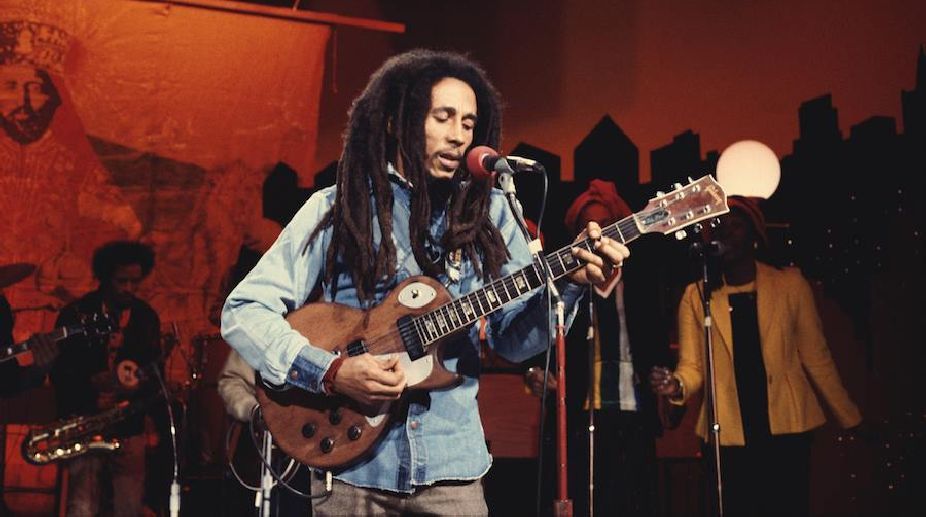"There's a natural mystic… blowing through the air…"
"None but ourselves can free our minds…"
"Don't gain the world and lose your soul, wisdom is better than silver or gold…"
"One love, one heart… Let's get together and feel alright…"
… the music plays on. Offbeat drumming, hypnotic delayed guitar strumming, Congo, long dreadlocks, powerful lyrics and peaceful message, are all to define reggae, the genre of music that enlightened the world of bondage, suffering and pain. And, representing it were the colours red, green and yellow. Red signifies the blood of the people who died for freedom from slavery. Yellow, the colour of gold which is symbolic of wealth, also love and peace. Green signifies the natural beauty of the land. And, the man was Bob Marley, a Rastafari, who made an inspiring difference in the world through his reggae music and left a deep impression among his followers and fans.
Born on February 6, 1945 in Jamaica as Robert Nesta Marley, the cultural and musical icon was a true genius. One of the greatest music artistes, an advocate for social justice and social change, Bob Marley‘s life and his music remains an inspiration to many in his country and across the world.
A specially gifted songwriter, singer and musician, the virtuoso recorded his first song Judge Not in 1962. The track was released the same year. A year later he formed a band Bob Marley and the Wailers. He separated from the band in 1974 and went solo and moved on to establish himself as one of the best-selling artistes of all time with his album Exodus.
In his relatively short span of career, Marley wrote canonical songs, almost on every subject and incorporated spiritual element in them. He was a follower of the Rastafari movement, a cult that has its belief in universal peace and love. He followed his faith till his last breath, but his music was way more than that. The brilliant numbers such asRedemption Song, Is This Love, Three Little Birds, No Woman No Cry, Get Up, Stand Up, I Shot the Sheriff, Buffalo Soldier, One Love and Zimbabwe are enough to understand his qualitative perception.
Marley walked the untrodden path and he was the first Third World musician to achieve such a feat as to have brought the entire reggae movement to the peak and then popularised the genre across the world. Reggae became a new sensation. Even great musicians such as Eric Clapton and Johnny Cash covered Marley songs.
Going by his beliefs, Marley was a strong proponent of love, peace, justice, equality and freedom. He always reflected that in his powerful music. His music has the weight of philosophical lyrics and words which were distinctive and new in nature for the world, actually derived from the Bible and Jamaican folk. The lyrics expressed the struggle and hope of African people under slavery or say for any proletariat.
The ‘natty dread’ lifestyle continued to inspire generations as he always did what he preached in his interviews, musically and religiously. He became the top most brand for merchandise, there are so many products such as clothes, gadgets, games, themes are being sold under his name.
There was an unforgettable moment in the music history, in 1978, when Jamaica was torn into civil war between political parties. Then politicians approached Marley to return to Jamaica and perform for peace. He then brought together two rival politicians on stage. Michael Manley (PNP) and Edward Seaga (JLP) actually joined hands on stage. The One Love Peace Concert created history and set a paradigm how peace can be achieved through music.
Another incident was when he composed the famous song Zimbabwe in 1979. Soon after Zimbabwe got freedom and Robert Mugabe assumed power, Marley was invited for their independence celebration and all of sudden, a civil unrest took place. But Marley kept on playing his music as if he was lost in his spirituality and he did not charge any money from the country.
Apart from music, Marley loved playing football. His love for the game was evident as he played the game throughout his life even on tours, studios or wherever he got the chance to play. In 1977, his toe got infected with melanoma, a rare skin cancer. Marley turned down doctor’s advice and kept on touring instead. His health deteriorated and the cancer had spread throughout his body, and he breathed his last on 21 May 1981. He was only 36, then. He left us too soon, but "there's a natural mystic blowing through the air…" He lives on in many hearts. Spread the love.






